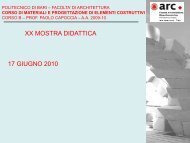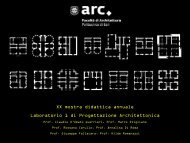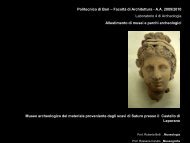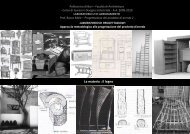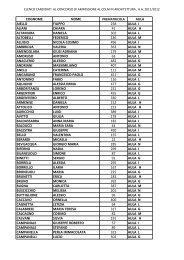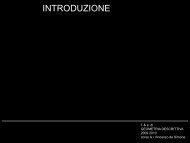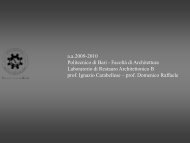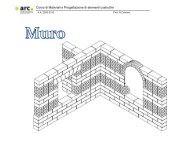Scarica il file pdf - Politecnico di Bari
Scarica il file pdf - Politecnico di Bari
Scarica il file pdf - Politecnico di Bari
Create successful ePaper yourself
Turn your PDF publications into a flip-book with our unique Google optimized e-Paper software.
44. I regolamenti <strong>di</strong>dattici154Tecniche ingegneristiche - primo moduloEngineering Techniques -first moduleIng-Ind 16-5 cfu3° anno / corso semestrale (I semestre)Area <strong>di</strong>dattica IV:Realizzazione del prodotto industriale:• Mat. 08 Analisi numerica• Icar 08, Scienza delle costruzioni• Icar 12, Tecnologia dell’architettura• Ing-Ind 16, Tecnologie e sistemi d<strong>il</strong>avorazioneLuigi TricaricoFinalità e contenuti <strong>di</strong>sciplinariIl corso ha come obiettivo quello <strong>di</strong>descrivere i principi teorici <strong>di</strong> base, leprestazioni e le principali applicazioni deiprocessi <strong>di</strong> trasformazione della materiaprima indefinita in sem<strong>il</strong>avorati ed inprodotti finiti. Dopo alcuni elementi sullarappresentazione grafica e definizionegeometrica del prodotto da fabbricare, <strong>il</strong>corso affronta lo stu<strong>di</strong>o delle fasifondamentali della produzione meccanica,dalle tecniche <strong>di</strong> fabbricazione del greggio(lavorazioni per fusione, per deformazioneplastica, saldatura) alle lavorazioni allemacchine utens<strong>il</strong>i ed alla loro automazioneed infine alle tecniche innovative <strong>di</strong>prototipazione e attrezzaggio rapido.Aims and contentsThe course objective is to describe thebasic theoretical principles, theperformance and the principal applicationsof processes of transformation of theindefinite firstsubject in semi-worked and in finishedproducts. After some elements on thegraphic representation and geometricdefinition of the product to bemanufactured, the course concerns thestudy of the fundamental phases ofmechanical production, from thetechniques of manufacture of raw materials(techniques for fusion, plastic deformation,wel<strong>di</strong>ng) to the production of automotiveparts and to its automation and finally theinnovative techniques of prototype andrapid equipment.Articolazione delle attività <strong>di</strong>datticheRappresentazione grafica e definizionegeometrica del prodotto da fabbricare.Proce<strong>di</strong>menti <strong>di</strong> fabbricazione per fusione.Proce<strong>di</strong>menti <strong>di</strong> fabbricazione perdeformazione plastica. I processi <strong>di</strong>saldatura e taglio.Lavorazioni per asportazione <strong>di</strong> truciolo.L’automazione delle macchine utens<strong>il</strong>i e lasua evoluzione: L’automazione dei processi<strong>di</strong> lavorazione; Macchine utens<strong>il</strong>i acontrollo numerico e centri <strong>di</strong> lavoro; Laprogrammazione delle macchine a controllonumerico; Integrazione CAD/CAM inoperazioni <strong>di</strong> tornitura, fresatura e foratura.La prototipazione rapida: Principi generali edefinizioni; tipologia <strong>di</strong> prototipi; <strong>il</strong> ciclodella prototipazione rapida; classificazionedelle tecniche <strong>di</strong> prototipazione rapida inbase ai materiali ut<strong>il</strong>izzati; tecniche <strong>di</strong>attrezzaggio rapido.Articulation of <strong>di</strong>dactic activitiesGraphic representation and geometricdefinition of the product to be manufactured.Manufacturing Procedures for fusion.Manufacturing Procedures for plasticdeformation.The processes of wel<strong>di</strong>ng and cutting.Techniques for removal of shavings.The automation of tools and their evolution:The automation of manufacturing processes;numerical control tools and work centres;The planning of numerical control machines;Integration of CAD/CAM in operations ofturning, m<strong>il</strong>ling and perforation.Rapid prototyping: principles anddefinitions; typology of prototypes; the cycleof rapid prototyping; classification of thetechniques of rapid prototyping related tothe materials used; techniques of rapidequipment.Iscrizione al corsoLe iscrizioni avvengono obbligatoriamentesulla piattaforma entro i primi <strong>di</strong>eci giornidall’inizio dei corsi.Modalità d’esameL’esame si baserà sulla valutazione delgrado <strong>di</strong> conoscenza raggiunto dallostudente in merito ai temi trattati nel corso,e sulla valutazione del grado <strong>di</strong> interesse,<strong>di</strong> competenza e <strong>di</strong> compiutezza riscontratinel progetto finale.Tecniche ingegneristiche - secondomoduloEngineering Techniques - second moduleIng-Ind 16-5 cfu3° anno / corso semestrale (II semestre)Area <strong>di</strong>dattica IV:Realizzazione del prodotto industriale:• Mat. 08 Analisi numerica• Icar 08, Scienza delle costruzioni• Icar 12, Tecnologia dell’architettura• Ing-Ind 14, Progettazione meccanica eCostruzione <strong>di</strong> macchineCarmine PappalettereFinalità e contenuti <strong>di</strong>sciplinariIl corso intende fornire quegli elementi <strong>di</strong>base per lo sv<strong>il</strong>uppo e la correttaprogettazione meccanica <strong>di</strong> componentiindustriali (industrial design anddevelopment).I principali argomenti sono:• Statica dei continui• Meccanica dei Materiali• Meccanica Sperimentale• Elementi <strong>di</strong> Progettazione MeccanicaAims and contentsThe course provides the basic elements forthe development and correct mechanicaldesign of industrial components (industrialdesign and development).The main contents are the following:• Statics of continuity• Material mechanics• Experimental mechanics• Elements of mechanical designArticolazione delle attività <strong>di</strong>datticheIl corso prevede lezioni teoriche,




